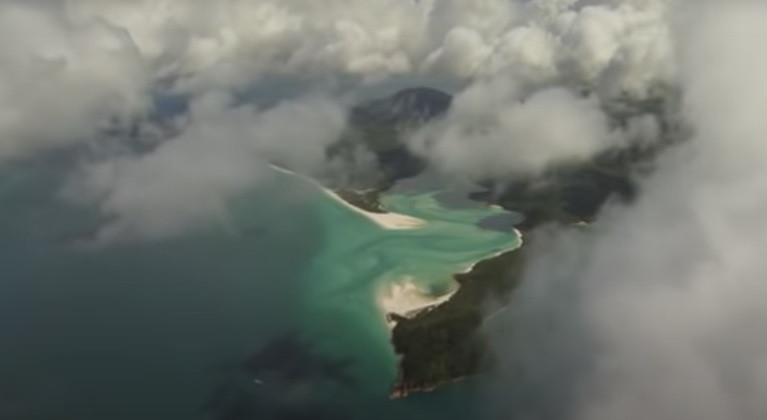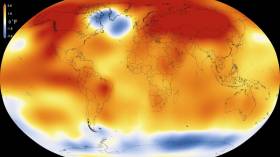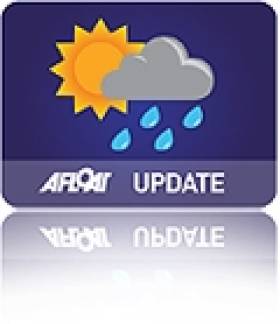Displaying items by tag: climate
Marine and Agriculture One of Top Four Government Departments to Provide "Climate Finance"
Seven per cent of Ireland’s financial support for climate action in developing countries came from the Department of Agriculture, Food and the Marine in 2021.
A report into “climate finance”, as it is known, found the marine and agriculture department was one of the top four Government departments to provide support to developing countries.
The support involves subsidising climate change mitigation, adaptation, technology development and capacity building.
Climate finance represented 10.2% of Ireland’s official development assistance in 2021.
International climate action, including “climate finance”, is a “key priority” for the Irish government, the report explains.
The 2020 Programme for Government sets out a commitment to double the proportion of ODA that is climate finance by 2030.
 Minister of Agriculture, Food and the Marine, Charlie McConalogue
Minister of Agriculture, Food and the Marine, Charlie McConalogue
At last November’s international climate summit, COP26 in November 2021, the Taoiseach announced a target for Ireland to provide €225 million per year of climate finance to developing countries by 2025.
The report sets out in detail Ireland’s climate finance expenditure in 2021, with the overall figure being €99.6 million.
The monies were drawn from the Department of Foreign Affairs; the Department of the Environment, Climate and Communications; the Department of Finance, and the Department of Agriculture, Food and Marine.
Of Ireland’s €99.6 million in climate finance in 2021, the Department of Foreign Affairs provided 57% (€57.1 million); the Department of Finance provided approximately 18% (€18.4 million); the Department of the Environment, Climate and Communications also provided approximately 18% (€17.5 million), and the Department of Agriculture, Fisheries and the Marine provided 7% (€6.6 million).
48% of this was spent on activities that specifically target adaptation (only), another 48% went on cross-cutting activities (which targets both adaptation & mitigation), and the remaining 4% went to mitigation (only) activities.
The 2021 figure of €99.6 million is an increase of 12.8% on the 2020 figure and stands as the highest amount of climate finance provided by Ireland to date.
Between 2016 and 2021, Ireland’s overall international climate finance has increased by 40%
The full review is here
Climate Change the Theme of French "Green Night of Ideas" Film Festival
Climate change and its impact on sea and land is the theme of this year’s “Night of Ideas” festival hosted by the French embassy.
The “Green Night of Ideas” lasts the month of February, with films available to view for free online with subtitles.
Two films by French director and photographer Yann Arthus Bertrand focus on climate justice, and what he views as a “disconnect” from landscape and seascape over the past half-century.
Bertrand’s documentary “Home” from 2009 portrays “the beautiful diversity of our ecosystem, how humans have been cohabitating with Earth are also threatening this fragile balance ”, according to French Honorary Consul for Connacht Catherine Gagneux.
“Through the sequence of the narration, facts and mesmerising aerial footage, it invites each and everyone of us to see how everything is interlinked and to ‘have the courage of the truth and look at each other with open eyes’,” she says.
Bertrand’s more recent film, “Legacy” is a “powerful cry from the heart”, Gagneux says.
“ He shares a sensitive and radical vision of our world, which he has seen deteriorate over the course of a generation, and reveals a suffering planet, and a confused humanity unable to take seriously the threat weighing on it and on all living things,” she says.
“ It is an emergency: everyone can and must take strong action for the planet’s future for our children,” Gagneux says.
The Green Night of Ideas 2021, a series of digital screenings followed by debates on climate change, runs through this month – with “Legacy” available to view for free until February 18th, and “Home” until February 28th.
All events are presented by the French Embassy in Ireland in association with the Alliance Française Network, Institut Français and Irish cultural partners.
To watch Bertrand’s films, click here and here
The full programme is here
Ocean Warming Poses Threat To Marine Wildlife & Food Chain
#OceanWarming - Warming oceans are not only throwing marine ecosystems into disarray, but are also encouraging the spread of water-borne bacteria and viruses around the world, a new study warns.
The Irish Examiner reports on new findings from the International Union for Conservation of Nature (IUCN), which says the world is "completely unprepared" for the consequences of ocean warming, which have already been seen as fish and marine mammal species move into cooler northern waters.
Coming in their wake, however, are tropical pathogens such as Vibrio vulnificus, related to the cholera bacteria, and potentially toxic algal blooms that could enter the food chain – comprising what scientists are calling the "greatest hidden challenge of our generation".
Rising sea temperatures are already wreaking havoc on corals off East Africa in the Indian Ocean, and affecting the breeding success of seabirds, ocean reptiles, jellyfish and plankton – the foodstuff of large baleen whales and basking sharks, which frequent Irish shores.
The Irish Examiner has more on the story HERE.
Help Record Old Weather Data to Predict Climate's Future
#WEATHER - A new project has been launched encouraging web users to help recover worldwide weather data recorded by Royal Navy ships a century ago.
Old Weather is 'crowdsourcing' volunteers to assist in transcribing weather readings and location data from First World War ships' logs into a database, in order to identify weather patterns and extremes the world over.
At present the site needs help transcribing data from 27 Royal Navy vessels and the courses they sailed, from Britain and Ireland to the farthest reaches of the globe.
The more people that take part in Old Weather, the more accurate the data extracted from the ships' logs will be.
Each logbook will be also looked at by more than one person, allowing mistakes and errors to be filtered out.
The historical data will enable scientists to improve their understanding of weather variabilty in the past and in turn improve their ability to predict weather and climate in the future.
For more details visit www.OldWeather.org.
































































